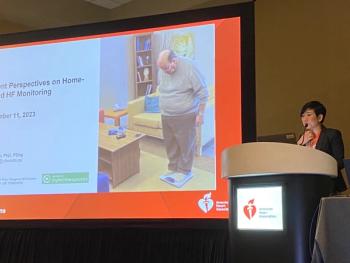
Four ways genetic testing is changing cancer care
Just as cancer takes many forms, so does genetic testing. Here’s what you need to know.
Just as cancer takes many forms, so does genetic testing. When a patient seeks genetic testing at UT Southwestern Medical Center in Dallas, Texas, they must first provide a detailed personal and family health history. “When their history includes early onset cancers or a specific constellation of cancers in multiple generations, my genetic counselors and I use the information to decide what genetic test to offer the patient,” says Theodora Ross, MD, PhD, professor of internal medicine.
Ross
Here, providers discuss different forms of genetic testing and how they improve patient care.
1. Diagnosing cancer earlier.
If patients receive a genetic test and are diagnosed with a genetic syndrome due to a known mutation, Ross advises them based on current National Comprehensive Cancer Network (NCCN) guidelines and patients’ unique characteristics. “We often suggest more screening for what is typically advised for a patient of that age and gender such as having regular skin exams, mammograms, magnetic resonance imaging, blood counts, ultrasounds, endoscopies, and colonoscopies. Suggestions might also include protective colectomies, mastectomies, or oophorectomies. Guidelines from NCCN and specialty groups are always being reassessed and refined.”
2. Treating cancer more effectively.
If cancer patients have inherited genetic changes in breast cancer genes such as breast cancer susceptibility gene BRCA1/2, ATM, or PALB2, physicians consider precision oncology drugs such as PARP inhibitors. “Several other genetic changes in tumors can guide treatment, so evaluating tumors for changes is a standard of care as well,” Ross says. Examples include evaluating lung tumors for EGFR and ALK mutations and melanomas for BRAF mutations.
3. Assessing cancer risk.
Zakalik
Dana Zakalik, MD, corporate director, Nancy and James Grosfeld Cancer Genetics Center; professor of medicine and oncology, Oakland University William Beaumont Medical School, Beaumont Health, Royal Oak, Michigan, says the health system orders next generation sequencing (NGS) and multigene panel tests to evaluate patients for hereditary risk due to inherited mutations in cancer risk genes. “By identifying these gene mutation carriers, we can determine who is at increased risk for getting a specific cancer,” she says. “We are then able to offer patients high-risk screening, prevention strategies (e.g., prophylactic surgery, chemoprevention), as well as promising targeted therapies.”
NGS is a much more efficient, rapid, and accurate strategy than what was used in the past, providing much more information. “Previously, we had to analyze genes one by one, which was a lot more labor intensive and costly,” Zakalik says. “NGS allows us to be more thorough and comprehensive. It opens up new ways of discovering who has an inherited predisposition to cancer.”
4. Identifying when additional testing might not be necessary.
Joy Larsen Haidle, MS, CGC, genetic counselor and NSGC past president, North Memorial Health Cancer Center, Robbinsdale, Minnesota, says once physicians identify a mutation, relatives can be tested via a site-specific test. Cascade testing-identifying close relatives of an individual with an inherited risk factor to determine whether they are also affected or are carriers of the same condition-extends the value of healthcare dollars to identify additional people at increased cancer risk and offers interventions in hopes of preserving health, she says. “When there is a known mutation in the family and an individual did not inherit it, heightened surveillance may no longer be necessary.”
New high-value rule
Genetic counselors save healthcare systems money by:
· Ordering the most appropriate tests,
· Selecting the best testing candidates, and
· Improving understanding of the results in medical decisions, which increases compliance with surveillance or risk reduction options and facilitates communication among family members to improve uptake of cascade testing.
Larsen Haidle
“Many health insurance policies require genetic counseling by a board certified genetic counselor or provider with genetics expertise prior to covering the genetic test, which attests to the value added to patient care,” Larsen Haidle says. “Over the past year, the trend has been to monitor the use of genetic testing and assure appropriate use for expensive tests.”
From the health insurer’s perspective, Angela Escobar, BSN, RN, medical coverage policy consultant, HealthPartners, Bloomington, Minnesota, says providing coverage of genetic testing for cancer predisposition allows members and their healthcare providers to assess individual risk for cancer based not only on personal and family history, but also on inherited genetic risk factors.
“We believe it is critical that members and their care providers work closely with a certified genetic counselor,” Escobar says. “The genetic counselor can assist them in determining whether genetic testing is likely to provide valuable information, which the member could use to make healthcare choices related to cancer prevention such as having more frequent cancer screenings. Additionally, the genetic counselor can use their in-depth knowledge of inheritance patterns and genetic risk factors to guide the healthcare provider and member in choosing the best genetic test.”
What insurers cover
Escobar
HealthPartners covers single-gene tests as well as multiple-gene panel tests for cancer risk assessment. “This ensures that members have access to cost-effective testing that is likely to provide them with valuable genetic information as quickly as possible,” Escobar says. “This way, they can make healthcare choices that take into account the results of their genetic test.”
In addition to genetic testing to determine predisposition to cancer, HealthPartners also covers a variety of genetic tests to guide clinicians in managing cancer when diagnosed. “These genetic tests generally use specimens taken from the tumor itself to determine which cancer drugs may be most effective based on the tumor’s genetic profile,” Escobar says.
HealthPartners covers many types of genetic testing for cancer management, including single-gene and multiple-gene analysis, as well as other laboratory methodologies which look at genetic-related information contained in a tumor sample. These tests can help clinicians caring for members with breast, colorectal, and other cancers identify the best treatment regimen for the cancer, Escobar says.
Cigna's coverage policies for genetic testing are based upon a review of the available published evidence and guidance from organizations such as the NCCN. For genetic testing of hereditary cancer syndromes, it requires genetic counseling both pre- and post-testing. “We do this to ensure that the most appropriate testing is being ordered and that every Cigna customer undergoing this testing is fully informed about the testing and implications of test results for both themselves and their immediate and extended family,” says Jeffrey Hankoff, MD, medical officer, Clinical Performance and Quality, Cigna, Bloomfield, Connecticut.
The insurer also follows NCCN guidelines for cancer treatment. “When the evidence demonstrates that genetic testing of tumor tissue can inform treatment decisions and affect outcomes, we cover the testing,” Hankoff says. Cigna also covers genetic testing when the evidence shows that it will impact medical decision making and health outcomes.
John Fox, MD, MHA, vice president, associate chief medical officer, Priority Health, Grand Rapids, Michigan, says establishing the analytic and clinical validity of genetic testing is critical to establishing coverage for a genetic test. “But even more important is establishing the clinical utility of genomic testing,” he says. “To establish clinical utility, the manufacturer of the test must show that the information changes a provider’s choice of treatment and that this change in clinical decision-making results in a better outcome that is relevant to the patient.”
Karen Appold is a medical writer in Lehigh Valley, Pennsylvania.
Newsletter
Get the latest industry news, event updates, and more from Managed healthcare Executive.























